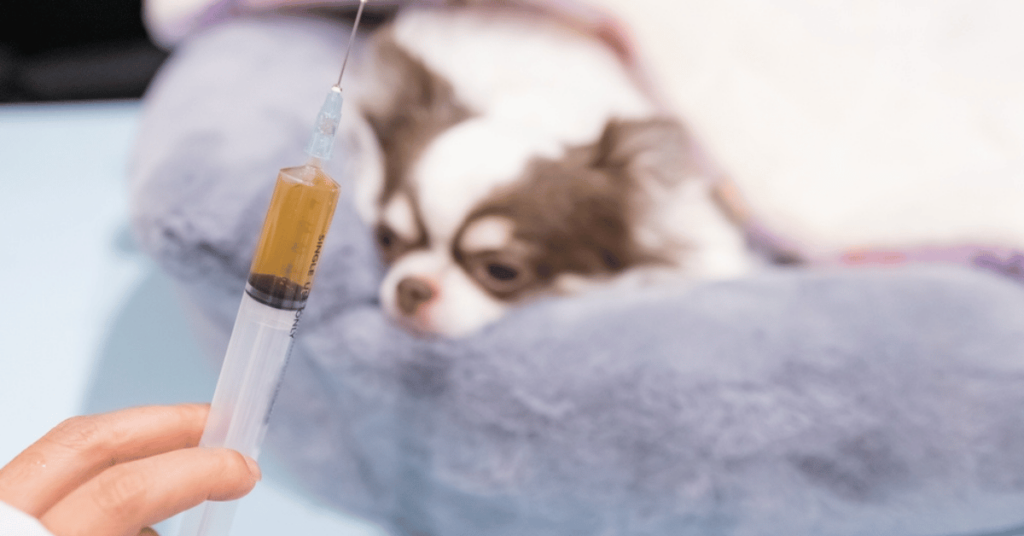Like all dog breeds, Chihuahuas come with their own set of health challenges. Being aware of the most common issues can help you keep your Chi happy, healthy, and by your side for years to come. Here are the six health issues seen most often in Chihuahuas and tips to prevent them.
#1. dental disease
Listed as the number 1 is Dental issues because it is the most common health challenge in Chihuahuas. Their small mouths can lead to overcrowded teeth, which makes them prone to plaque buildup, gum disease, and tooth loss. If left untreated, dental disease can even impact their heart and kidneys.
Prevention Tip:
Brush your Chihuahua’s teeth daily (or as often as possible), offer dental chews, and schedule regular cleanings with your vet. Professional dental cleaning with your veterinarian at least once a year, however, every six months is recommended for Chihuahuas.
Dental chews can be effective for dogs when used as part of your Chihuahua’s oral hygiene routine, but they are NOT a replacement for professional dental cleaning and brushing.

#2. Luxating Patella (Kneecap Dislocation)
A luxating patella is also one of the most common health challenges in chihuahuas. That’s when the kneecap slips out of place, and it’s especially common in small breeds like Chihuahuas. You might notice your dog skipping a step, limping, or holding up one leg when walking. Mild cases may not need surgery, but severe ones often do.
Prevention Tip:
Monitor and maintain your Chihuahua’s weight. A healthy weight will help to reduce stress on joints and avoid letting them jump from high surfaces
#3. HEART DISEASE
Chihuahuas are prone to a condition called mitral valve disease, where the heart’s valves don’t close properly, causing blood to leak backwards. This can lead to heart enlargement and eventually heart failure. Coughing, fatigue, and difficulty breathing can be signs.
Prevention Tip:
Regular vet checkups can catch heart issues early. Maintaining a healthy diet and weight also supports heart health.
#4. Hypoglycemia (Low Blood Sugar)
Most common in puppies and very small adults, hypoglycemia can be dangerous. Signs include trembling, lethargy, disorientation, or even seizures. If you suspect low blood sugar, a quick dose of honey or corn syrup can help stabilize your pup until you can get to the vet.
Prevention Tip:
Feed small, frequent meals throughout the day, and monitor for symptoms, especially in young Chihuahuas.
#5. Collapsed Trachea
A collapsed trachea is one of the scariest health challenges in Chihuahua because it sometimes sounds like they are choking. A collapsed Trachea can cause coughing that sounds like a honking goose, difficulty breathing, or intolerance to exercise. This condition occurs when the rings of cartilage in the trachea weaken.
What is known as “backward sneezing” can also sound like a honking goose, however, a “backward sneezing” is harmless whereas a collapsed trachea can be serious.
Don’t try to diagnose it yourself. Have your Chihuahua examined by your veterinarian to be sure of a correct diagnoses.
Prevention Tip:
Always use a harness instead of a collar to reduce pressure on the neck, and avoid exposure to smoke or allergens.
#6. Obesity: A chihuahua health challenge
Being overweight for a Chihuahua is dangerous and is certainly one of the most challenging. Because of their small frame, even a little extra weight can stress a Chihuahua’s joints, heart, and overall health. Obesity can lead to diabetes, arthritis, and other serious issues.
Prevention Tip:
Stick to a balanced diet and resist those puppy-dog eyes begging for table scraps. Daily exercise like short walks or indoor play can help maintain a healthy weight.
Need help with your Chihuahuas weight? CLICK HERE
FINAL THOUGHTS
Chihuahuas may be small, but they need big care. Many of these health problems can be prevented or managed with regular vet visits, good nutrition, proper dental care, and a safe, loving environment. By staying informed and proactive, you’ll give your Chihuahua the best chance at a long, healthy life.
